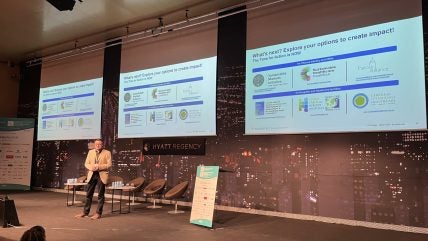
Sustainability remains a key theme at this year’s Clinical Trials Supply (CTS) Europe conference in Barcelona, Spain, with day one (6 March) opening with a discussion about the responsibility of the healthcare sector to address the climate crisis and achieve net zero in the coming decade.
Leading the opening keynote, “Healthcare transition into a Net Zero world”, Novartis’ development environmental sustainability lead Jürgen Wieland said continuing with business as usual is “not an option”, explaining how Novartis aims to achieve carbon neutrality across the supply chain by 2030.

Discover B2B Marketing That Performs
Combine business intelligence and editorial excellence to reach engaged professionals across 36 leading media platforms.
Wieland highlighted the importance of tackling Scope 3 emissions – indirect emissions that occur in a company’s value chain. One of the problems associated with Scope 3 emissions is a lack of transparency and standardisation associated with measuring them. However, assessing the carbon footprint of clinical trials is not as difficult as it used to be, with methodology and tools now becoming available via the Sustainable Healthcare Coalition.
“The calculation of the footprint and the identification of the hotspots is actually not so complicated anymore,” said Wieland.
Novartis identifies patient kits, clinical sample distribution, and travel activities as major contributors to its total footprint, accounting for roughly a third of its emissions.
So how can clinical trials go ‘greener’? Wieland highlighted the importance of a centralised approach to reduce clinical trial costs, including supply chain and shipment-related activities, which can account for 33% of total costs.

US Tariffs are shifting - will you react or anticipate?
Don’t let policy changes catch you off guard. Stay proactive with real-time data and expert analysis.
By GlobalDataThere is also a benefit in decentralising some elements, such as monitoring travel reduction and virtual visits, to improve efficiency and reduce costs. The introduction of reusable shipping boxes as opposed to single-use boxes can avoid the cost of $4m, and avoid 5,000 TCO₂, which equates to the lifetime of 20,000 trees.
Pressure has been mounting on pharmaceutical companies to address emissions, with the industry’s attitude towards sustainability ramping up over the past few years. However, challenges remain in examples such as rare disease trials, an area where sustainability is not always a priority.
Emphasising the importance of innovation to reduce emissions throughout the clinical trials value chain, Wieland signed off the session by saying: “I think for all of the COOs who are willing to stay relevant in the business in the next five to ten years, it’s probably good advice to engage in strategies to reduce the environmental impact.”
The Clinical Trial Supply Europe conference is taking place in Barcelona from 6-7 March 2024.





